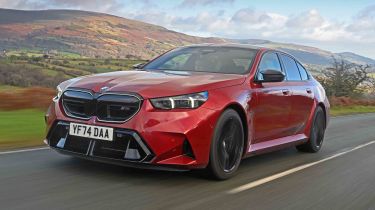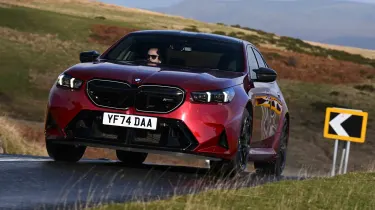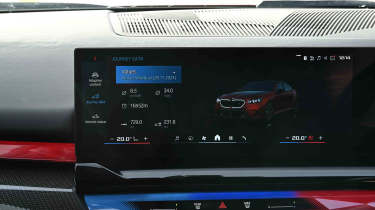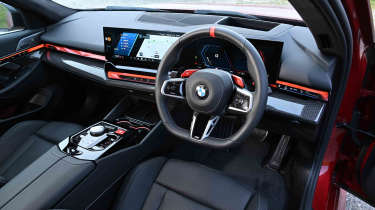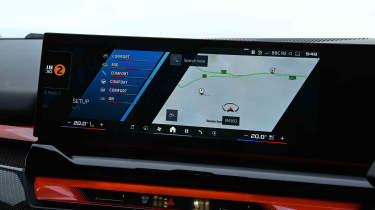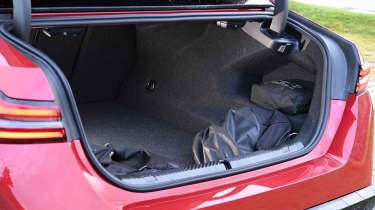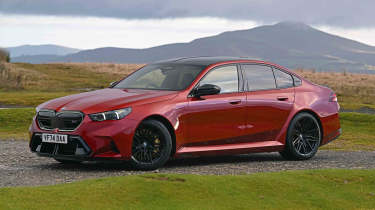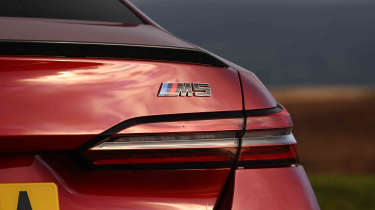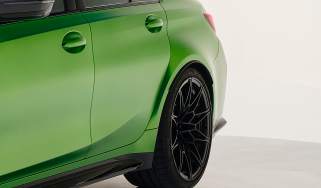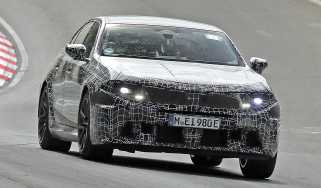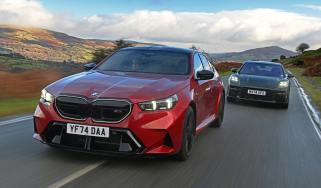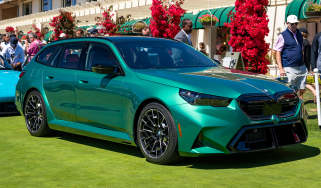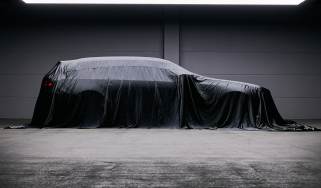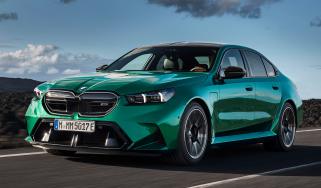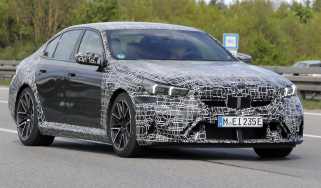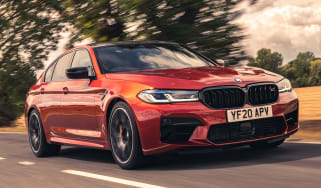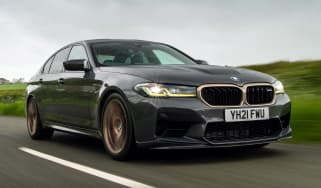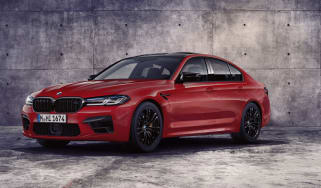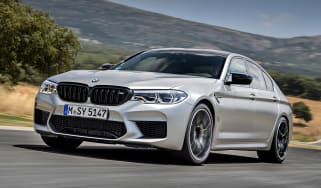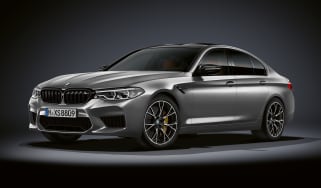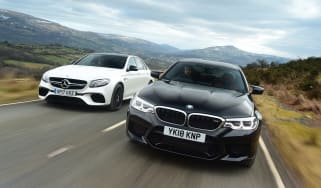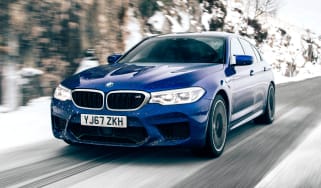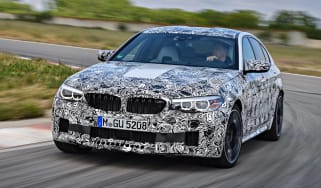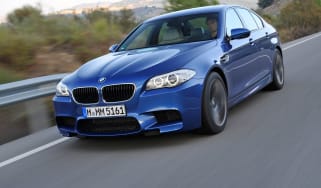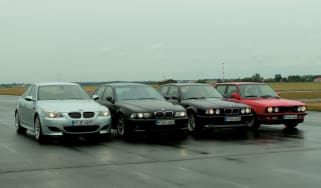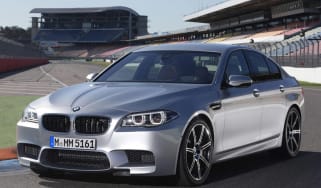BMW M5 review
The seventh-generation BMW M5 (G90) is a seriously fast and deeply refined mega-saloon

Is the BMW M5 a good car?
Absolutely. The seventh-generation G90 BMW M5 is a monstrously fast super-saloon that’s a fair bit more spacious than before and is bristling with new technologies that keep it relevant – and surprisingly clean. Its hybrid V8 powertrain has a range of ability that no previous M5 driver could have dreamed about, with a genuine 40-mile electric range and impressively low emissions (and therefore tax implications) to go with it. And at the press of a button, the car can be transformed into a tyre-shredding twin-turbo V8 thunder-saloon.
The only real issue is that when that transformation happens, although it unveils a mighty amount of performance, there’s not enough feel or driver satisfaction to go with it. Emotionally, the new M5, clever as it is, feels a bit cold. Its V8 engine lacks aural charisma. Its steering lacks true feel. And on the road it drives more how you’d imagine a BMW M7 might. And while it tries hard to disguise its weight, in the end it still weighs two and a half tonnes. So while this first version is a deeply impressive car, it isn’t quite a great one. We’ll need to wait for the more focused versions that will come in future for that.
| Key specs | |
| Fuel type | Petrol plug-in hybrid |
| Body style | 4-door saloon |
| Powertrain | 4.4-litre twin-turbo V8 PHEV, four wheel-drive |
| Safety | Five stars Euro NCAP (standard 5 Series, 2023) |
| Warranty | Three years, unlimited mileage |
How much does the BMW M5 cost?
It might be odd to suggest that the M5 is competitively priced, but with a starting price of around £111,000, it’s on a par with the non-hybrid Audi RS 7 and significantly less expensive than a Porsche Panamera that offers the same sort of performance. Whether those capable of spending well over six figures on a performance car care about such things is another question entirely.
Used - available now
The latest M5 comes as a four-door saloon or five-door BMW M5 Touring estate for around £2,000 extra, and both come extremely well specified as standard. There are numerous individual options that can be specified, though – from carbon-ceramic brakes with gold calipers to an M Driver’s Package that increases the top speed from 155mph to 189mph.
There are two main option packs for the UK – Comfort and Ultimate. The former costs £1,800 on the saloon and £1,600 on the Touring, and adds seat ventilation and heating, plus roller blinds for the side windows. The Ultimate pack is a whopping £19,500, or £18,900 on the Touring. It includes all the individual interior options available plus a full carbon visual pack for the exterior – including the carbon-ceramic brakes – and an Alcantara headlining.
This is the seventh-generation M5, the first having been unleashed in the late eighties with less than half the power of this latest M-hybrid model. Unlike the BMW M3, the new M5 isn’t offered in Competition Pack guise in the UK – at least not to begin with. In the fullness of time, more performance-orientated versions will follow.
Engines, performance & drive
The latest BMW M5 is a deeply complex machine on many levels, and one that takes time to understand and appreciate. It also takes miles to comprehend the sheer range of its abilities, and ultimately to work out if all the technologies gel to create a car that’s any good to drive or not.
| Model | Power | 0-62mph | Top speed |
| BMW M5 saloon | 717bhp | 3.5sec | 155mph |
| BMW M5 Touring | 717bhp | 3.5sec | 155mph |
An M5 always needs to be powered by something pretty special, and the previous F90 generation model didn’t shy away from that, courtesy of its twin-turbocharged V8. There’s no downsizing this time around, because a 4.4-litre unit with 577bbhp and 750Nm looms large beneath that bonnet. In order to up the ante though, that petrol engine is boosted by an electric motor, too.
On its own, the e-motor musters up 194bhp and 280Nm (although through what BMW calls a pre-gearing stage, the effective output to the wheels is boosted to 450Nm). With the two power sources combined, this M5 makes a staggering 717bhp and 1,000Nm.
Drive is sent to all four wheels via an eight-speed M Steptronic gearbox in which there are five different drive modes; Hybrid, Electric, eControl, Dynamic and Dynamic Plus. At start-up the car is four wheel-drive, yet if you select 2WD within the M Driver menu, your seventh-generation M5 can still be transformed into a tyre-smoking rear-wheel-drive monster if you fancy it – at which point all 717bhp goes directly to the 21-inch rear wheels and you are very much on your own.
How the new M5 drives – and how fast it feels – depends largely upon which drive mode you select. In Electric it glides around like a reasonably calm, decently potent electric car that can hit 87mph before the petrol engine kicks in. Its electric range stands at between 35 and 40 miles, depending on how hard you drive it.
Around town, the M5 defaults to electric mode from start-up, which means it moves away smoothly and silently from rest. Judging the car’s extremities can be a bit tricky, but otherwise, it’s an easy car to drive at low speeds. However, the ride is overly hard in the sportier modes, and even in its softest setting, we’d prefer just a little more give.
In Hybrid, the car itself works out how much energy to unleash through the driven wheels, depending on which dynamic mode you’ve selected for the engine, gearbox, chassis, steering and even the brakes – all these individual elements can be tailored individually within the M driver’s menu, and within each main drive mode. As we said, this is a complex machine that needs time to understand.
Only in Dynamic and Dynamic Plus modes is the powertrain’s full potential available – so all 194bhp of electric power plus 575bhp from the twin-turbo V8. And although this doesn’t quite add up to a combined 769bhp (the set-up’s total output is a mere 717bhp) the M5 still feels nutcase fast if you put your foot down and hold it there for a few magical seconds along an autobahn.
The official performance claims are pretty mind-altering for a car that weighs 2,510kg with just a driver on board. Against the stopwatch, the new M5 takes two-tenths of a second longer to cover the 0-62mph sprint than the outgoing M5, but for two reasons, that really doesn’t matter. First, the new car’s time of 3.5 seconds is hardly sluggish anyway, but more important is the fact that thanks to the punch of that electric motor, it feels much faster than the old car in almost any real-world situation.
Throttle response is phenomenal: the electric motor fills the gap in the torque for the brief moment it takes for the V8 to come on song to launch you at the horizon. The gearbox is rapid (we preferred it in its less aggressive modes, because it’s smoother), and while the engine doesn’t sound as meaty as the V8 you get in a Porsche Panamera, it still has a pleasing growl. Some might wish for something just a tad more vocal, though.
The M5’s razor-sharp throttle response, aided by its electric motor and combined with some very clever chassis systems, means the BMW really doesn’t feel like a 2.5-tonne car for the most part on A & B roads. Dynamically it’s very hard to fault – thanks to its combination of four wheel-steering, four wheel-drive, huge tyres and a fundamentally well sorted chassis, it sticks to the road like the proverbial you-know-what for most of the time, seemingly no matter how hard you push it.
The steering is the key element from the ride and handling perspective; the four-wheel system is fairly well synchronised from front to rear, so once you get used to the fact it’s almost hyper-responsive, the M5 points at an apex like a car which weighs significantly less.
Yet at no time is there much true feel through the steering or seats. Turn-in response is excellent, and grip levels are sky high, but the way the M5 telegraphs how it builds up towards its limit is, on occasions, quite numb. You end up trusting that it will do what it’s claimed it can do without there ever being much emotion involved. And that’s almost certainly BMW’s intention with this car. More involving incarnations will come in the future and will be more engaging, they say, which is fair enough given that this is the base version – the one that’s designed to appeal to the widest market, not just rabid enthusiasts.
There’s a gentle push from the rear as you apply power at the exit of a corner (or lots, if you switch to the rear-wheel-drive mode – a system that can only be activated by first disabling all of the stability control systems), so you can cover ground at huge speeds. This is all with the proviso that you’re on reasonably smooth ground – once the road starts to undulate and introduce unusual cambers, both of which are common on UK roads, some small clues about the car’s mass reveal themselves. Impressive though it all is, we can’t help but wonder what those chassis engineers could have achieved if this tech were applied to a car that weighed 500kg less.
All that size and weight would have you believe that the M5 is more a GT car than a out-and-out sports saloon, but at times it feels a little too hardcore to fill that brief. The ride is never quite relaxed enough to be truly sumptuous, and the car likes to hunt around in grooves on a motorway.
One final feature worth noting is a new ‘boost’ function, which you deploy by holding the left-hand gearshift paddle for a couple of seconds. No matter what drive mode you’re in, this gives you full beans from the powertrain for a burst of around 10 seconds – should you wish to pass something pretty damn quick. It can only be specified if you have the ‘M Drive Professional’ option pack fitted, but it’s a fresh piece of tech that will appeal to some M5 drivers more than others.
MPG, emissions & running costs
By the standards of a car with 717bhp, the M5 will probably not be as expensive to run as you might first expect. During our time testing the car, we achieved 34mpg.
Considering we covered plenty of long journeys – which easily used up the available EV range before journey’s end – plus did loads of enthusiastic driving, that’s a very reasonable return. For comparison, when we tested the smaller, lighter BMW M4 CSL, it only managed to return 21.8mpg.
Drive the M5 keenly across a B-road in Dynamic or Dynamic Plus modes and the V8 will still burn through fuel in a predictably horrendous manner; we saw as little as 18mpg in bursts on test. The fuel tank is relatively small for a car of this size and weight at just 60 litres, but that still gives a real world range of over 400 miles.
In e-Control mode (in which the powertrain regenerates as much electricity from the brakes and engine as it can) the petrol consumption goes up a touch (compared with Hybrid) but driven in the correct way – on a gentle throttle in a high gear, ideally at a constant speed with regular but mild use of the brakes – the M5 will refill its 22.1kWh battery (18.6kWh usable) from almost zero in around 20 minutes, which then negates the need to plug it in and charge manually. You’ll use more fuel in the process, of course.
Plug the car into a home charger, and those with the facility to top up at an 11kW rate will see the M5 fully recharge from zero in an impressive two-and-a-quarter hours. It’s three hours and 15 minutes to top up via a 7.4kW wallbox, while the M5 doesn’t have the facility to accept faster DC charging.
As it stands, the M5 sits in the eight per cent band for Benefit-in-Kind tax, which means that for a six-figure performance car, its company car tax rate of £3,563 looks reasonable. However, things will soon climb much higher. From 2025, emissions testing for plug-in hybrids will be adjusted from the current unrealistic standards to a system that is more representative of real-world driving. By the end of the year, the M5 and other PHEVs will need to be re-homologated, which will see its official CO2 increase significantly.
Predictably, the BMW M5 sits in the highest group 50 insurance band and based on our sample quote, it would cost well over £3,000 a year to insure. With high-performance cars like the M5, it’s always worth shopping around – including with specialist brokers – to see if a more tailored quote could offer a more competitive option.
After three years or 36,000 miles, the M5 with the optional Ultimate Pack is only expected to hold on to 44.78 per cent of its original value, which translates into a loss of almost £53,000 in that time. That’s a very similar return to an Audi RS 6 Avant, but behind the Porsche Panamera, which retains 48.6 per cent.
| Model | MPG | CO2 | Insurance group |
| BMW M5 saloon | 176.6mpg combined | 37g/km | Group 50E |
| BMW M5 Touring | 166.2mpg combined | 39g/km | Group 50E |
Interior, design & technology
In the flesh the BMW M5 looks low, wide and unmistakably muscular – you can tell it’s an M car from 100 yards away – but it also looks physically big on the road. Far more so than any previous M5.
The M5 benefits from the usual 5 Series strong points of a superb interior finish and slick infotainment tech, elevated – for better and for worse – by some M division-specific tweaks inside the cabin. For the most part, the interior feels suitably sturdy and luxurious, although there’s a little too much shiny piano black plastic on show for our liking, especially on the centre console.
The M5’s dashboard is largely the same as in the standard 5 Series. That means that it looks stylish enough with a wraparound ambient lighting strip, but it could be improved with some physical buttons for the climate controls.
The difference is that you’re viewing the cabin from a set of excellent sports seats, and gripping onto a new steering wheel which, typically for the brand, feels a bit too thick to hold comfortably, and plays a part in robbing the car of some of its delicacy. A big, red starter button on the dashboard adds a little theatre to the start of every drive.
Lighting plays a strong role in the look and feel of the interior, and this changes in a variety of ways depending which drive mode you select. In Comfort the lighting is calm, while in Dynamic lots of surfaces turn bright red. In Track the visual distractions are actively reduced, while the instrument display shows less detail but shows more information about revs, tyre temperatures, fluid temperatures and so on.
The main instruments are well designed and clear to read in all modes, plus there are two M buttons on the steering wheel that can be used to deploy whatever presets you choose for the car’s dynamic characteristics (from powertrain to ESC to brake response and even rear-wheel drive). Yet the way you select the three different display modes (Normal, Dynamic and Track) is less well resolved because this requires extra finger-work down on the centre console – on what BMW describes as the ‘M-specific control panel’ – where there’s a rash of additional buttons to access yet more menus.
Sat-nav, stereo and infotainment
M5 drivers are presented with the same pair of gently curving displays as in the rest of the 5 Series range – albeit with some M-specific changes. Unlike Porsche, BMW has chosen to move completely away from a traditional clock-face layout for the instruments. While some will argue that the transition to a digital screen is a worthwhile venture, to our eyes it looks a bit too fussy.
That aside, the infotainment system loads quickly and is easy to navigate thanks to the mix of touchscreen technology and the iDrive clickwheel.
The M5 uses BMW’s OS 8.5 for its entire infotainment system, and it’s designed to be operated by touch or voice control. Full smartphone integration is included, be that Apple CarPlay or Android Auto, and there’s also a Personal eSIM that links the car to your phone via the My BMW app and to your personal BMW ID via a digital key. This means car settings can all be stored on a driver’s phone. All you do is climb in and the car sets itself up to whatever presets you have stored.
The best way to use the system is via voice control using BMW’s Intelligent Personal Assistant, which essentially does whatever you ask it to – from moving the seat to setting destinations for the navigation system. There’s also a 5G antenna installed in the car, to which up to 10 different devices can be connected at any one time.
Dive into the M5’s driver modes, and some will find the level of settings available to be rather bewildering. While M5s have generally offered sport modes and adjustable settings for damping and steering response, now there are so many choices that you could spend hours sampling varying combinations just to find a sweet spot for certain conditions.
The dampers, steering, drivetrain (both engine and level of hybrid energy recovery), noise, stability control systems and even the response of the brakes can all be tinkered with – and that’s before you’ve decided if you want the hybrid system to run in fully electric, hybrid or higher-performance settings.
Fortunately, once you’ve settled on your preferred combination, this can be programmed into one of the big, red M buttons on the steering wheel. But there were times when we simply wanted to get in and drive the thing without having to play around so much first.
Our M5 test car was equipped with a Bowers & Wilkins audio set-up, and it’s one of the very best in the business. Clarity, power and overall performance from the 18-speaker system are outstanding. On weaker sound systems, the bassy drones of a car’s tyres at motorway speeds can drown out the lower frequencies of music, but the B&W system has a subwoofer beneath each front seat to compensate, so regardless of where you’re driving, the music needn’t stop. Or, there’s always the roar of that V8 to appreciate instead.
Boot space, comfort & practicality
The M5 feels substantial from the driver’s seat, but the dashboard isn’t as high as you’ll find in some similarly sized Mercedes models, nor do you sit quite as close to the ground as in the M3. So once you’ve grown accustomed to the car’s physical size, it’s not too intimidating to drive.
Rear-seat occupants have loads of space to stretch out in the back, with kneeroom and headroom both excellent. Heated seats, USB-C ports and extra climate controls mean that it’s an easy place in which to get comfortable. The two Isofix child seat points are easy to access behind their plastic covers.
For a near five-metre-long car, a 466-litre boot isn’t particularly impressive; an Audi RS 7, for example, has a 535-litre capacity despite a more swoopy appearance. The battery for the M5’s PHEV system, which takes up room under the boot floor, is to blame here; indeed even the all-electric BMW i5 has 490 litres of boot space in saloon form. Of course, this generation of M5 is also available as a Touring estate, which increases the boot capacity to a more practical and spacious 500 litres.
The rear backrests can be split 40:20:40 and fold to allow much longer items to be stored partially within the cabin. The bootlid is electric and works hands-free via the key. Both M5s (saloon and Touring) are available with an optional towbar, with the maximum trailer load being 2,000kg. There’s also the option of a trailer coupling that retracts electrically.
| Dimensions | |
| Length | 5096mm |
| Width | 1970mm |
| Height | 1510mm |
| Number of seats | 5 |
| Boot space | 466 litres |
Safety & reliability
Euro NCAP tested the all-electric version of the 5 Series, the BMW i5, in 2023 and awarded it five stars. Its 86 per cent score in the Vulnerable Road Users category was the best mark of any car tested that year (only a small number of marks were deducted for an autonomous emergency braking system that doesn’t accommodate for pedestrians behind the car when reversing), while it performed strongly across all of the other areas, too.
The M5 is clever enough to be able to be parked, driverless, via the my BMW app from 200 metres away. This would not be possible were it not in possession of myriad cameras and sensors that monitor its movements – and therefore help protect its occupants or anyone who comes anywhere near it from the outside – to ultimately prevent it from coming into contact with anything, or anyone. With or without a driver on board.
All the usual driver-assist systems are in place – lane, parking and reverse assistance, plus pedestrian avoidance from all sides. The Michelin Pilot Sport 5S tyres are not run-flats so you are still at the mercy of a puncture, but an early warning system should give you as much notice as possible if a tyre starts to deflate.
As standard, the M5 comes with a three-year, unlimited-mileage warranty. That’s the same duration as offered on rivals from Audi and Mercedes, but they are pegged back to a mileage limit of 60,000. BMW also offers three years’ breakdown cover.
The lithium-ion battery within the hybrid system is warrantied for a further five years (making eight in total), again without any mileage restrictions. If the battery’s efficiency rating drops significantly during those eight years, BMW will still replace it free of charge, although the firm’s engineers say they are confident the battery will last way, way longer in reality.
For added convenience, BMW offers buyers the option of an inclusive service package when buying the M5. It’s a little expensive at just over £2,000, but it covers all maintenance until the car is four years old and can be paid in instalments at around £42 a month.
| Key standard safety features | Euro NCAP safety ratings |
|
BMW M5 alternatives
There are two versions of the M5 available – saloon and Touring – and they sit at the very top of the brand’s M-car range. Eventually they will be joined by more focused, and inevitably more expensive versions that wear badges like Competition and CS, but for the foreseeable future, what you see is what you get.
As such, there aren’t many true rivals for the M5 beyond the more predictable ones from Germany; those being the similarly priced but less potent Audi RS 6 Avant, the Porsche Panamera GTS and the Mercedes-AMG E 53.
Go for a full EV and you might want to consider the Lotus Emeya or a Lucid Air as alternatives. But sadly there’s no longer a British rival for the M5, unless the Bentley Continental GT or Flying Spur count, given that they now come with hybrid drive.
The Italian Alfa Romeo Giulia Quadrifoglio isn’t quite in the same league technically, dynamically or ecologically.
As always, the M5 is the peak of the 5 Series line-up, but there are other compelling variants sitting just below it. In one corner is the 550e xDrive. Like the M5, it’s hardly a slouch, offering the same e-motor paired to a six-cylinder petrol engine for a total of 482bhp and a 0-62mph time only eight-tenths of a second shy of the range-topper. It’s 280kg lighter, too. In the other corner, the pure-electric i5 M60 has 593bhp from its twin-motor set-up, and hits 62mph from rest in 3.8 seconds, while offering a WLTP range of 320 miles.
Frequently Asked Questions
The BMW M5 gets a three-year, unlimited-mileage warranty, with the battery and hybrid drivetrain guaranteed for eight years.
